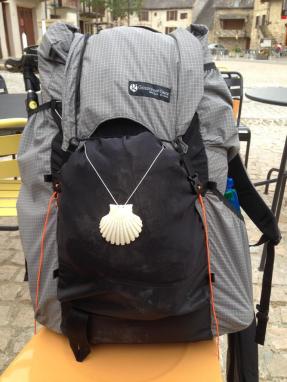As [Jesus] was setting out on a journey, a man ran up, knelt down before him, and asked him, “Good teacher, what must I do to inherit eternal life?” Jesus answered him, “Why do you call me good? No one is good but God alone. You know the commandments: ‘You shall not kill; you shall not commit adultery; you shall not steal; you shall not bear false witness; you shall not defraud; honor your father and your mother.’” He replied and said to him, “Teacher, all of these I have observed from my youth.” Jesus, looking at him, loved him and said to him, “You are lacking in one thing. Go, sell what you have, and give to [the] poor and you will have treasure in heaven; then come, follow me.” At that statement his face fell, and he went away sad, for he had many possessions.– Mark 10:17-27
One of the great joys of hiking the Camino Santiago de Compostela in 2014 was that each of us in our team carried so few possessions. I could tell you everything I had with me in my pack. It was easy to run through a mental checklist to make sure I had packed all my things (though that didn’t stop me from leaving all my toiletries behind in Saint-Jean-Pied-de-Port just before the long hike

over the Pyrenees). There was a mindfulness– an intentionality– about my things, a gratitude for the quality and utility of each thing I owned. Although I put more care into packing for the Camino than I had for most previous trips, it was to a good end– I could travel lightly and be as unencumbered as possible over the hundreds of kilometers we’d hike.
My Camino pack was so different from the life I was living, with closets filled with stuff. In the years before I did my pilgrimage I was already frustrated by the sheer number of things I owned, and was even more frustrated by the habits I’d acquired for buying things. Mine were “respectable” habits– always within certain boundaries, never going into debt, selling things to buy other things– but the net result was that we had too many things, and I didn’t have any good strategies for getting rid of the stuff we had or for limiting the flow of new stuff into my house and office. If a book looked useful or interesting for my work as a chaplain, I’d buy it. If I kept running out of shirts, I’d buy more shirts (instead of, you know, doing more laundry). If I couldn’t find the AA batteries because I didn’t know where they had been stored, I’d buy new batteries.
At a certain point, I started deviating from the normal reading of the story of the Rich Young Ruler (above). What I’d heard countless times was that the young man was “too attached” to his possessions– that his possessions meant more to him than following Jesus. For the last couple years, I’ve imagined the guy saying to himself, “This is all immensely attractive, but getting rid of my stuff? That could take years!” Maybe he hated all his extra stuff as much as I did, but felt too overwhelmed to do anything about it.
I have been surprised by how widespread the problem of possessions is in our culture, even for Christians who follow Jesus who had “nowhere to lay his head.” The proliferation of storage facilities, the very common use of garages as overflow areas for stuff that doesn’t fit in closets (more than a third of all two-car garages in the US can’t house two cars because one or more bays is being used to store, well, stuff)– these phenomena reveal a culture that is awash in things but lacking a sense of purpose or reflection.
The good news is that it doesn’t actually have to be that way. Throughout all of Christian history, there have been those who’ve found a way to be free of their stuff and to follow Jesus without the burdens of entanglement with possessions. And in the contemporary era, there is a growing movement of so-called “minimalists” who can help provide strategies for getting rid of the stuff we don’t need. One such person is Josh Becker, whose blog Becoming Minimalist provides great strategies for those looking to simplify, disentangle, and clarify.
What if we took Jesus’ words not just as an overwhelming and dispiriting challenge? What if he is offering us a grace-filled opportunity to let go of our stuff? What if, following him more closely, we decided to travel lightly? What if we lived our lives like pilgrims, carrying only what we need to get to our destination? And what if we believed that God was actually ready to help us live this way?
